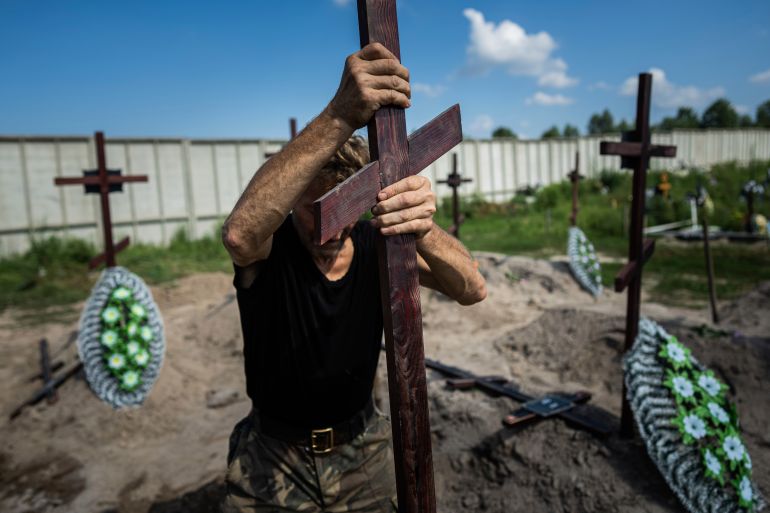Russia’s war is a crime, but all sides face legal questions
The law did not fall silent on Russia’s war on Ukraine. Yet have all branches of law been heard?

The United Nations General Assembly has condemned in the strongest terms Russia’s aggression against Ukraine in violation of the UN Charter, which only allows the inter-state use of force for self-defence or under the Security Council’s authorisation.
The UN High Commissioner for Human Rights and the Organization for Security and Co-operation in Europe have also found serious violations of international humanitarian law in Russia’s conduct of the war. In short, “jus contra bellum” – the legal term for the general prohibition of the use of force by one state against another – and the the international legal rules that seek to limit the destruction of armed conflict have both been clearly violated by Russia.
Keep reading
list of 4 itemsUkrainians sigh with relief as US unlocks aid but say it won’t repel Russia
Qatar hails mediation ‘milestone’ as it hosts freed Ukrainian, Russian kids
US secretly sent long-range ATACMS weapons to Ukraine
So what then of Russia’s reasonings for its invasion?
From NATO’s expansion and collective self-defence by the so-called Donetsk People’s Republic and Luhansk People’s Republic to the alleged humiliation and attacks on ethnic Russians, the Kremlin has presented a range of arguments to defend its position on the war.
These are among a growing set of diplomatic postures adopted by states that their opponents dismiss as pretexts. Unsurprisingly, Russia has cited the pretext that the United States used to invade Iraq in 2003 – the possession of non-existent weapons of mass destruction – to criticise Washington. Separately, the Group of Seven (G7) nations have accused China of using the recent visit of US Speaker Nancy Pelosi to Taiwan as a pretext for provocative military activities near the self-governing island.
If “pretext” is to be treated simply as a synonym for “justification”, then international law is clear: The presence of an adversary military alliance on Russia’s border is not an armed attack that could justify self-defence by force under jus contra bellum. Likewise, the separatist regions of Ukraine do not satisfy the criteria of statehood for Russia to assert the right to join any collective self-defence. Humanitarian intervention by force to protect civilians without UN Security Council authorisation remains illegal. That is according to Russia’s own judgement on NATO’s bombing of Belgrade in 1999.
However, the fact that these are not legal justifications for the use of force does not mean that they bear no legal significance. On the contrary, they point to the need for a harder look at allegations of violation of other branches of international law that just do not receive the same level of attention as jus contra bellum and international humanitarian law.
For instance, there is a debate on whether the verbal promises made by officials of NATO states in the early 1990s not to expand the alliance eastward represent legally binding obligations that have since been breached. Allegations of violations of human rights law against Russian minorities in Ukraine have also been made.
Likewise, the American invasion of Iraq on false claims does not change the fact that Iraq’s compliance record with disarmament obligations had also been poor. Similarly, for those adopting a one-China policy, foreign official visits to Taiwan may violate the legal norm against non-interference in Beijing’s internal affairs.
While they do not justify the use of military force, dismissing these arguments as “pretexts” ends up muting other branches of international law on human rights, disarmament and diplomatic arrangements that form the context for the use of force.
Such an approach betrays a vision that privileges events over the tendencies that lead up to those events. We risk allowing legal issues to build up until the eventual outbreak of war, when the brutality of conflict compels us to look to jus contra bellum and international humanitarian law for urgent protection. By then, there are other challenges to relying on just these strands of international law.
When leading powers are involved – as is the case in Ukraine and was in Iraq – a potential Security Council deadlock weakens the possibility of enforcement of the law. Once a war starts, it takes on a life of its own and rational compliance with the law becomes even harder.
The challenges, even with the best of intentions, in complying with international humanitarian law in a hot war can be seen in the recent row over Amnesty International’s criticism of Ukraine’s conduct in the current conflict.
Of paramount importance, therefore, is the prevention of war – itself a duty under human rights law. As the war in Ukraine shows us, the tragic results of ignoring the duty to prevent war are maximum hostility between warring parties, resistance to any negotiated peace settlement and unpredictable, potentially catastrophic escalation.
The views expressed in this article are the author’s own and do not necessarily reflect Al Jazeera’s editorial stance.
